Ribosome fractionation
mRNA translation is essential in the regulation of gene expression and represents the most energy consuming process in cells. Accordingly, dysregulation of mRNA translation is considered to play a major role in a variety of pathological states. Ribosomes play a central role in protein synthesis. Ribosomes also host chaperones, which facilitate folding of nascent polypeptides, thereby modulating function and stability of newly synthesized polypeptides. In addition, emerging data indicate that ribosomes serve as a platform for a repertoire of signaling molecules, which are implicated in a variety of post-translational modifications of newly synthesized polypeptides as they emerge from the ribosome, and/or components of translational machinery.
Polyribosome (polysome) fractionation by sucrose density gradient centrifugation is a method to separate mRNAs into actively translating and non-translating fractions depending on their association with polysomes. By this protocol, cell lysates are fractionated by sucrose density gradient ultracentrifugation. Free mRNA fraction and various ribosomal fractions, such as 40S, 60S, monosomes and polysomes are collected by fractionation.
Polysome fractionation allows visualize general translation efficiency in the cell. In addition, this method can be used for biochemical analysis of ribosome- and polysome-associated factors such as chaperones and signaling molecules or particular mRNAs.

